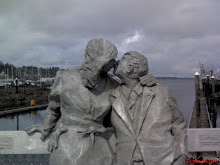I decided to begin educating myself on the Presidential Candidate Barack Obama. Up until now, I'll be honest: I was unabashedly supporting him without really being informed on who he is or what he thinks. That's kind of huge for me to admit, by the way. :) So I'm educating myself on him through the methodology of postmodern research.
The distinction between postmodern reasearch on Web 2.0 and modern research through the pages of books is the path on which my research took me. It was not a path of linear logic or a chronology or a topical outline or even an index of related topics. It was a path that is only possible to tread because of "links." These "links" become connectors of unrelated things, which stands in stark contrast to the method of the book.
What am I talking about? Let me tell you through outlining my research adventure through Wikipedia, the free online encyclopedia.
1. Type the words "Barack Obama."
2. Begin reading the article written about Barack Hussein Obama, Jr.
3. Find myself intrigued by his educational background and click on "Columbia University ," wondering if it is an ivy league school.
(By the way, the article on Columbia University "needs additional citations for verification." Wikipedia also implores its readers and editors to "Please help improve this article by adding reliable references. Unsourced material may be challenged and removed." That note has been up there since October of 2007.)
4. Then I discover that before attending Columbia, he went to Occidental College for two years in Los Angeles. In 1912, the trustees of Occidental College were going to convert the school to an all-male institution, but the strong reaction from the students prevented this from happening.
5. Intrigued by his religious affiliation, I click on (Trinity United Church of Christ), which is found in his biographical profile to the right of the article. I discover it's a mega church, the largest congregation of that denomination, and located in Chicago, Illinois.
6. A few lines below the previous link, I click on "Political positions."
a. First, I follow the links provided in the "contents" to Darfur and Armenian Genocide, discovering that he's definitely humanitarian.
b. The link to Armenian Genocide takes me to a paragraph right above the heading that labels Obama's "Social Policy," of which the first subhead is "Abortion and contraception." I'm immediately interested and soon become more familiar with Planned Parenthood and discover Obama's stated position on abortion: "Abortions should be legally available in accordance with Roe v. Wade." (This quote is footnoted to its source: "1998 Illinois State Legislative National Political Awareness Test.")
c. The Planned Parenthood link leads me to "sexuality education."
i. The first thing I perceive upon arriving at the Wikipedia article on sex education is "An early 20th century post card" that "documents the problem of unwanted pregnancy."

(By the way, I am legally allowed to post this image for your own viewing pleasure because it is considered to be a part of the public domain and its copyright has expired. This image is also a part of the collection know as the Wikimedia Commons.)
ii. I continue to scroll down the page and discover "Sex education worldwide." I discover that sex education in Sweden has been mandatory since 1956 and that in Finland the "Population and Family Welfare Federation provides to all 15-year-olds an introductory sexual package that includes an information brochure, a condom and a cartoon love story." (This is footnoted back to its source, "Sex Has Many Accents," an article in Time Magazine.)
Finally, I had to stop myself or else I could be surfing the web for hours, and that is the point! As I explored the knowlege-filled caves of Wikipedia, the links allowed me an experience that is only possible in the world of Web 2.0 - right at my finger tips. No frantic flipping through pages or running my finger down a list of topics in the index. No walking around shelves of book, scanning the spines for the right number. Just a click on a link.
The shape of wisdom is changing.

No comments:
Post a Comment